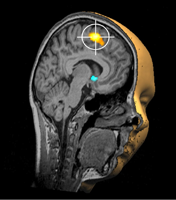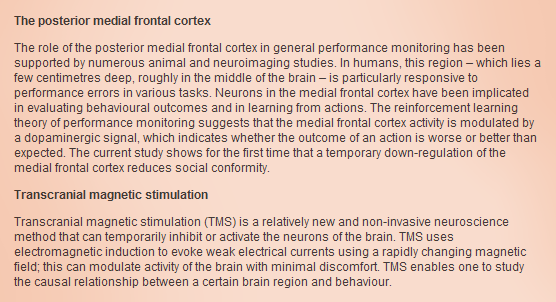New research reveals the neurobiological mechanism behind herd behaviour
Just how hard is it for us to reach truly independent opinions? A ground-breaking experimental study has confirmed the specific neurobiological mechanism in the brain that controls our instinct to conform. The findings, from a team of researchers from the Erasmus Centre for Neuroeconomics, the Donders Institute for Brain, Cognition and Behaviour at Radboud University, Nijmegen and the University of Basel, were published in last month’s edition of the Journal of Neuroscience.
 The ‘herd instinct’, when humans adapt opinions and behaviours to conform is a well-established fact. Neuroscience studies on humans and animals have suggested that neural activity in a particular part of the brain triggers an automatic ‘error’ signal causing an involuntary correction to the behaviour. But what if that mechanism could be suspended? Would we then think and behave differently?
The ‘herd instinct’, when humans adapt opinions and behaviours to conform is a well-established fact. Neuroscience studies on humans and animals have suggested that neural activity in a particular part of the brain triggers an automatic ‘error’ signal causing an involuntary correction to the behaviour. But what if that mechanism could be suspended? Would we then think and behave differently?
Researchers tested this theory in a carefully-designed experiment, in which participants were rendered temporarily immune to social influence for about an hour using a non-invasive method called transcranial magnetic stimulation (TMS).
Participants were randomly assigned to one of three groups: TMS, control or placebo and asked to quickly judge 222 faces on their physical attractiveness, rating them on a scale of 1 to 8. Having judged each face, they were then shown a score – higher, lower or equal – and told this was the average score given to that face by other participants. After a short break, they were asked, without warning, to rate the same faces again.
The second evaluation showed that although individual shifts in scoring varied, most participants from the control and placebo groups altered their ratings for the faces to be closer to the ‘average’ group score. However, those in the TMS group changed their views to a much lesser extent: they were immune to ‘group pressure’.
“This study thus provides real evidence of the specific neurobiological mechanism which lies behind social conformity,” says <link people ale-smidts _self>Ale Smidts, Professor of Marketing Research and one of the study’s co-authors. “It shows that, unless they get an internal ‘error’ signal, people will not conform. We had already shown in a previous study that the strength of the error signal differs in individuals – which is why some people are more conformist than others.”
“Overall, the results suggest that some of the most commonly cited sources of social influence – such as normative group pressure, cognitive dissonance and advice – in fact generally share the same fundamental neurobiological mechanisms. Thus making fully independent opinion almost impossible to achieve,” explains lead author, Dr. Vasily Klucharev, of the University of Basel, formerly postdoctoral researcher at Erasmus University.
Additional information:

The article “Downregulation of the Posterior Medial Frontal Cortex Prevents Social Conformity”, by Vasily Klucharev, Moniek A. M. Munneke, Ale Smidts, and Guillén Fernández, appeared in the Journal of Neuroscience on August 17, 2011.

